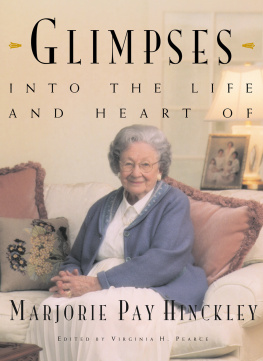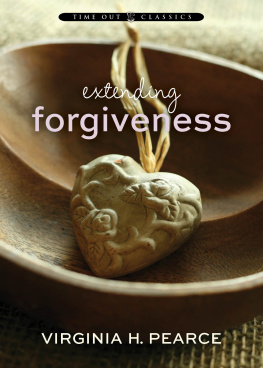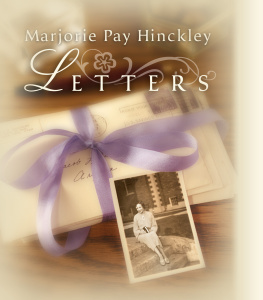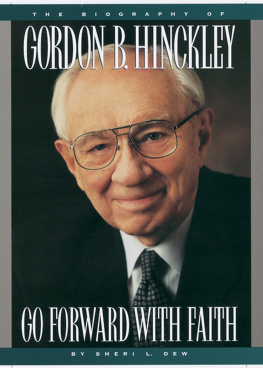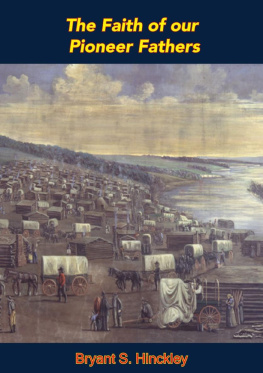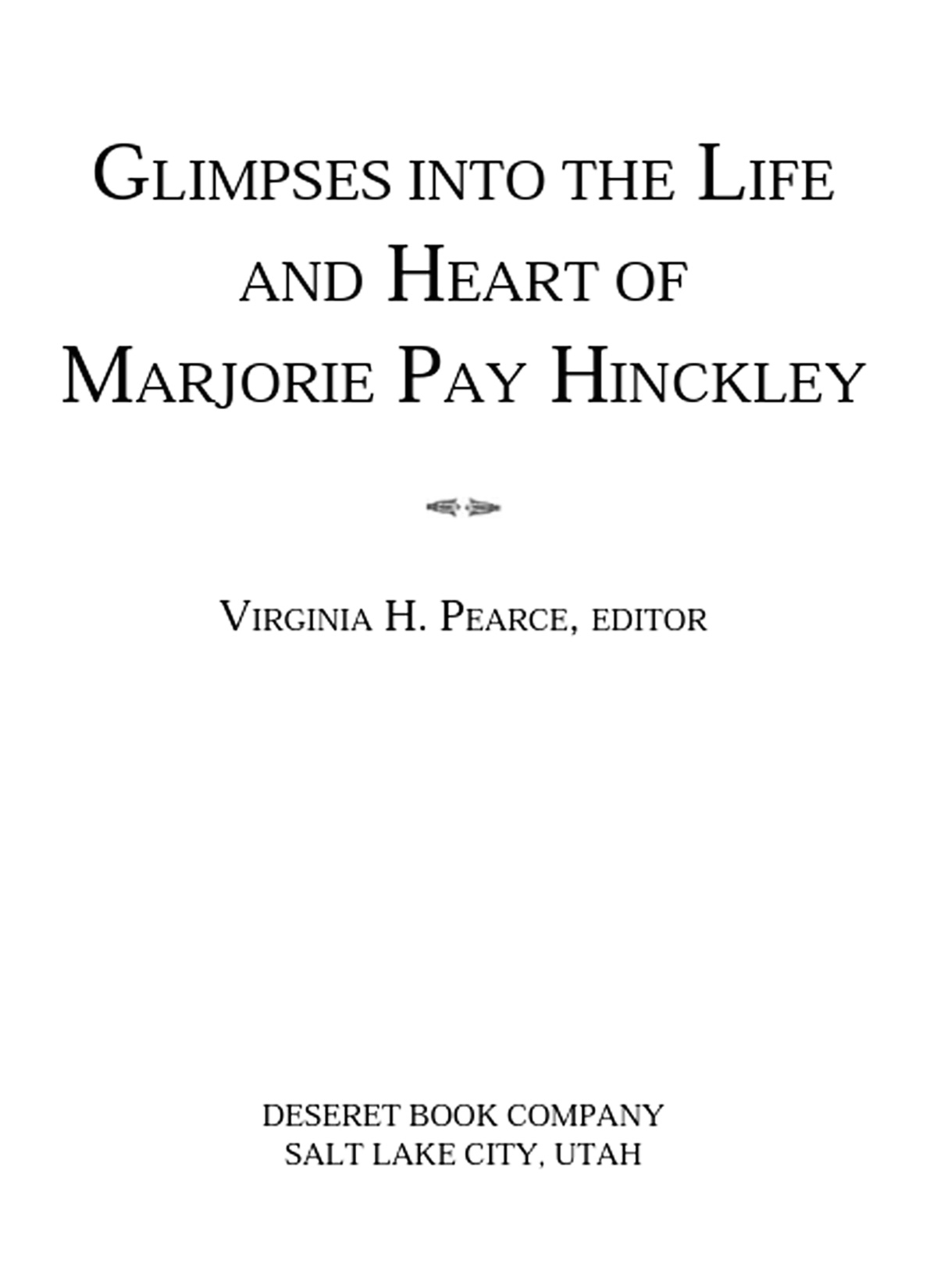1999 Virginia H. Pearce.
All rights reserved. No part of this book may be reproduced in any form or by any means without permission in writing from the publisher, Deseret Book Company, P.O. Box 30178, Salt Lake City Utah 30178. This work is not an official publication of The Church of Jesus Christ of Latter-day Saints. The views expressed herein are the responsibility of the author and do not necessarily represent the position of the Church or of Deseret Book. Deseret Book is a registered trademark of Deseret Book Company.
Photo credits:
Page 46, photo by Stuart Johnson/Deseret News
Page 90, photo by Kristan Jacobsen/Church News
Page 109, photo by Stuart Johnson/Church News
Pages 152 and 173, photos by Richard M. Romney. 1998 by Intellectual Reserve, Inc. Used by permission
Page 157, photo by Craig Dimond. 1998 by Intellectual Reserve, Inc. Used by permission
Page 183, photo by Don Busath
Page 191, photo by Leah Hogsten/Salt Lake Tribune
Library of Congress Cataloging-in-Publication Data
Glimpses into the life and heart of Marjorie Pay Hinckley/edited by Virginia H. Pearce.
p. cm.
Includes index.
ISBN 1-57345-523-7
1. Hinckley, Marjorie Pay. 2. Mormon womenReligious life.
I. Hinckley, Marjorie Pay. II. Pearce, Virginia H.
BX8695.H57G57 1999
289.3'092dc21
[B] 99-10317
CIP
Printed in the United States of America 18961-6431
10 9 8 7 6 5 4 3 2 1
For
Georgetta Paxman Pay
and daffodils
PACKED AND READY
*
For decades one of the lovely wives obscured by position,
identity melded into his, only he and she knowing
her invisible name tag wrought by what hears birds on the morning
or lifts prayers into dreams into unselfconscious becoming:
the handling of children's awakenings like hot bread
from the oven of knowing how for fevers or bruises,
the keen apprehension of too much or too little,
the quieting of fears with affectionate laughter,
the pouring in of humor to lighten a pot of message,
the girl still dancing in too-long-stood-on legs,
behind the bright eyes the bright head the bright soul
a metaphor for leavening hearts like yeast in dough.
Irresistible the tuning, the measure of health
like green finding its way on a grey day in early spring
or a bag packed for untimed leaving
on command of love needing a hand and
closeness closer than staying behind in body or spirit,
the gracious accompaniment among strangers
reaching and being reached, those lucky or unlucky before
made to know special in a moment of resurrection:
brief as a talk at a pulpit
lasting not as a leap, but a succession
of brief, amazing risings,
each one making possible the next
for whoever is present in the radiant presence
of this woman, this lovely wife, this forever young woman
replete in knowing exactly how,
abundant in aging, personification of radiant faith.
She is a vivid body of good, graced by
a loving God's expectation and surely fulfillment
packed shining and ready for whatever
and when.
Emma Lou Thayne
FOREWORD
*
BY SHERI DEW
I will never forget the afternoon I had Marjorie Hinckley all to myself. The setting was her comfortable condominium home in Salt Lake City, and my excuse for imposing on her time was a formal interview about her life with her husband, President Gordon B. Hinckley. I quickly found, however, that Marjorie Hinckley is not formalgracious, yes; dignified, delightful, unassuming, absolutely. But formal? That's a word I would never use to describe Sister Hinckley, who has an uncanny knack for making anyone her friend and bolstering the person's spirits in the process. I call it Marjorie's Magic, the spell this diminutive woman casts that sends you away feeling light-years better about yourself than you did when you entered her presence. It is a sensation that combines total acceptance and joie de vivre, an optimism and enthusiasm about life that, if transmitted to society at large, would put therapists and pundits permanently out of business.
That afternoon in her condo I might have wished for the clock to stand still. It was pure delight to listen in as she reminisced about the unexpected and even dramatic twists and turns her life has taken during her sixty-plus years as the wife of President Gordon B. Hinckley.
She recalled their teenage years together in Salt Lake City's Liberty Stake, where Gordon's father served as stake president for more than a decade. They had attended different high schoolshe went to LDS High School, and she to East Highbut in the after-school hours they had found themselves in the same crowd. She had been impressed from the outset with the skinny young man who shared her sense of humor but also demonstrated a more serious, studious side. Their first date was to a Gold and Green Ball when she was eighteen. That night she told her mother, This young man is going somewhere.
Their relationship continued to blossom, and they dated fairly steadily for some time. Even still, when Gordon left in 1933 to serve in the European Mission headquartered in London, he and Marjorie had not made any promises to each other. But each quietly hoped that the other would still be interested two and a half years hence.
As it turned out, they were. And their courtship picked up where it had left off. Though it didn't take long for either of them to realize that they were meant for each other, they didn't marry immediately. It was, after all, the bottom of the Depression, as he would refer to it ever after, and marriage in that nerve-wracking economic climate was something people didn't jump into without serious planning and a generous dose of caution and courage.
As Sister Hinckley relived for me the events leading up to their April 1937 marriage, she said something I will never forget. When Gordon came home from his mission, she remembered, I could tell that he had changed. I had always known he was remarkable, but now there was something even more distinctive about him. As we dated and then became engaged to be married, something became obvious to me. I knew that he loved me, and that he would always be good to me. But I also knew that I would never come first with him. She paused for a moment before adding, And that was okay.
When I suggested that some women might balk at such a situation, she replied: I knew Gordon was going to devote his life to the Lord. And I couldn't think of anyone I'd rather have him devoted to.
Her statement was so matter-of-fact that she might as well have been rattling off the grocery list. There was no self-pity or evidence of any grand sacrifice on her part, nor was there any sense of self-congratulation, just an expression of her simple faith and mature spiritual equilibrium. At that moment, it was clear to me that she had been perfectly suited to stand at the side of a man who was destined to play a vital role in the twentieth-century Church.
All of my subsequent interactions with Sister Hinckley, and particularly with the two of them together, have borne that out. It is now simply impossible for me to imagine one without the other. Not every woman would have put up with the incessant hammering, sawing, and painting that went on for months, even years, at a time as her husband turned bedrooms into kitchens and front entryways into dining rooms. Little did she know that she had married a

